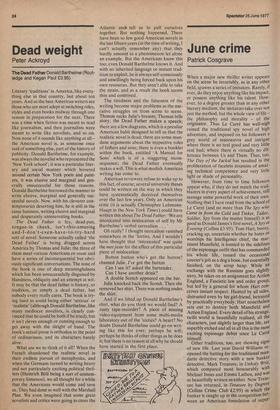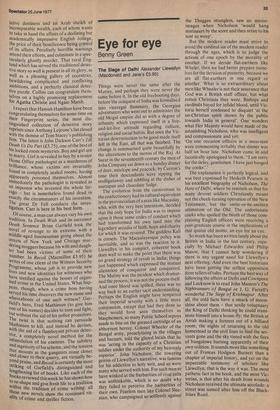June crime
Patrick Cosgrave
When a major new thriller writer appears on the scene he invariably, as in any other field, spawns a series of imitators. Rarely, if ever, do they enjoy anything like his impact, or possess anything like his talent. However, to a degree greater than in any other literary medium, the imitators take over not just the method, but the whole view of life — the philosophy and morality — of the originator. Thus Le Carte has well-nigh ruined the traditional spy novel of high adventure, and imposed on his followers a grey world of manoeuvre and intrigue where there is no real good and very little real bad; where there is virtually no difference between Us and Them. Thus, too, The Day of the Jackal has resulted in the proliferation of faceless assassins of amazing technical competence and very little light or shade of personality. However, from time to time followers appear who, if they do not match the trailblazers in every aspect of achievement, still manage some powerful work of their own. Nothing tbat I have read from the school of Le Carre (and no more than The Spy who Came in from the Cold and Tinker, Tailor, Soldier, Spy from the master himself) is as good as Donald James's first novel, A Spy at Evening (Collins L3.95). Toni Hart, boozy, cracking up, uncertain whether he hates ot worships his Intelligence chief, the martinent Mansfield, is hunted to the sidelines of the espionage outfit that has commanded his whole life, tossed the occasional courier's job as a dog a bone, but essentiallY finished, on the scrap heap. While an exchange with the Russians goes slightly awry, he takes on an assignment for Action England, a Fascistic law and order group, but led by a general for whom Hart conceives instant respect. Hunted by all sides, distrusted even by his girl-friend, betrayed by practically everybody. Hart nonetheless sets out to destroy both Mansfield and Action England. Every detail of his strange, twilit world is beautifully realised, all the characters, just slightly larger than life, are superbly etched and all in all this is the most exciting espionage debut since Le Carte himself. Other traditions, too, are showing signs of new life. Last year David Williams reopened the batting for the traditional mandarin detective story with a new banker detective, Mark Treasure, in Unholy Writ, which compared most honourably with Michael Innes and Emma Lathen, and was as beautifully written as either. Now Treasure has returned, in Treasure by Degrees (Collins Crime Club £2.95) in which the banker is caught up in the competition between an American foundation of super
lative dottiness and an Arab sheikh of incomparable wealth, each of whom wants to take in hand the affairs of a declining but academically impressive English College, the price of their beneficence being control of its affairs. Peculiarly horrible warnings attend their efforts, and culminate in a spectacularly ghastly murder. That rural England which has served the traditional detective story so well is present in all its glory, as Well as a pleasing gallery of eccentrics, bewildering complicated and conflicting ambitions, and a perfectly classical detective puzzle. Collins can congratulate themselves on a highly promising replacement for Agatha Christie and Ngaio Marsh.
I expect that Hamish Hamilton have been congratulating themselves for some time on their Fingerprint series, the most dis tinguished collection of detective story reprints since Anthony Lejeune's list closed
with the demise of Tom Stacey's publishing firm. The latest is John Dickson Carr's Till Death Us Do Part (£3.75), one of the best of his locked room mysteries. Boy and girl are to marry. Girl is revealed to boy by a senior Home Office pathologist as a murderess of brilliance, whose victims are invariably found in completely sealed rooms, having a. Pparently poisoned themselves. Almost Immediately the pathologist is revealed as an impostor who invented the whole farrago — but is nonetheless found dead in exactly the circumstances of his invention. The great Dr Fell conducts the investigation. Carr is here in his best form.
Of course, a man can always vary his own tradition. In Death Wish and its successor Death Sentence Brian Garfield took the novel of revenge to its extreme with a middle-aged businessman going about the streets of New York • and Chicago murdering muggers because his wife and daughter had been victims of some of their number. In Recoil (Macmillan £3.95) he Writes of one client of the Witness Security P.rogram me, whose job is to provide new lives and new identities for witnesses who have testified against the bosses of organised crime in the United States. What happens, though, when a crime boss having served his time discovers the new name and Whereabouts of one such witness? Garfield's hero, Fred Mathieson (to give him one of his names) decides to turn and fight, but without the aid of his police protectors. The twist is that nothing can persuade Mathieson to kill, and instead he devises, With the aid of a flamboyant private detective, a completely novel method for the intimidation of his enemies. The subtlety and ingenuity of his scheme, and the tension that mounts as the gangsters come closer and closer to their quarry, are virtually beYond praise, and Recoil is certainly the most striking of Garfield's distinguished and ,lengthening list of books. Like each of the books reviewed this week he has shown how to re-shape and give fresh life to a tradition Within the tradition of crime writing: all these new novels show the continued vitality of crime and thriller fiction.















































 Previous page
Previous page